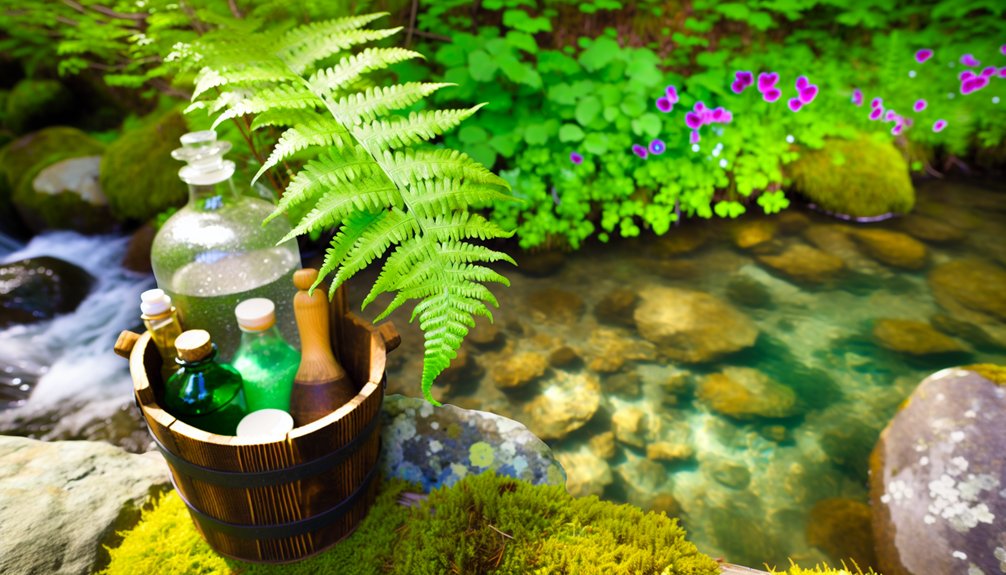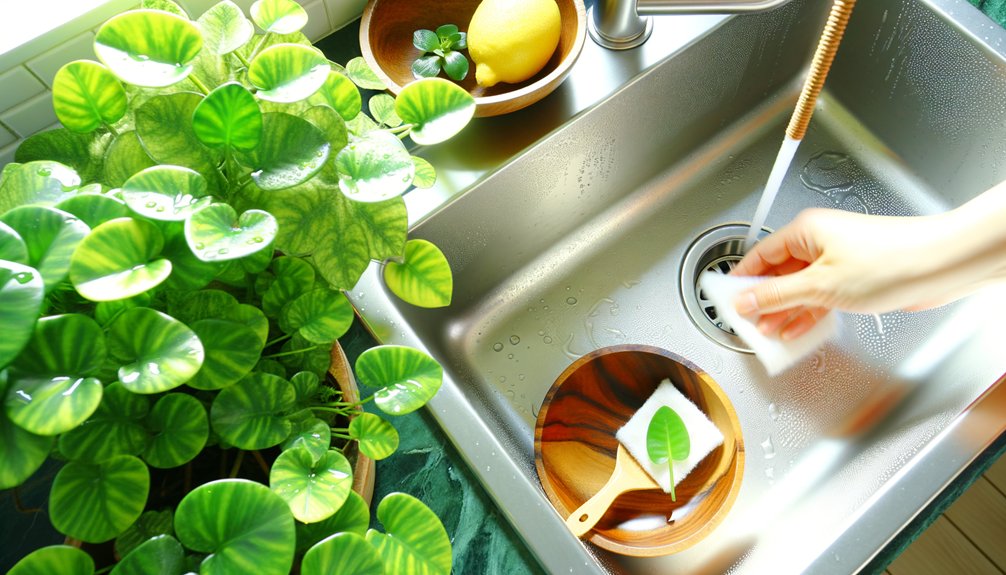For eco-friendly drain cleaning, individuals can use baking soda and vinegar, which creates a fizzy reaction to break down clogs. Another effective method is hot water combined with dish soap, ideal for tackling grease buildup. Biological drain cleaners offer a safe alternative, utilizing natural enzymes to decompose organic materials without harmful chemicals. These practices not only promote plumbing health but also protect the environment. Learn more about additional tips and techniques for maintaining clean, efficient drains.
Baking Soda and Vinegar: A Natural Solution

Many homeowners seek effective yet eco-friendly methods for maintaining their plumbing systems, and baking soda combined with vinegar offers a simple and natural solution. This powerful duo creates a fizzy reaction that efficiently breaks down grease, food particles, and other debris, making it ideal for addressing clogged drains. To employ this method, one should pour 1/2 cup of baking soda followed by 1 cup of vinegar down the drain and allow the mixture to sit for 15 minutes to 1 hour for tougher clogs. After this period, flushing the drain with hot water guarantees that any remaining residue is cleared. This non-toxic solution is safe for all plumbing types, presenting an environmentally friendly alternative to chemical drain cleaners. Regularly utilizing baking soda and vinegar not only maintains clear drains but also prevents future clogs, empowering homeowners to take control of their plumbing care while protecting the environment.
Hot Water and Dish Soap: Grease Buster
Transforming clogged kitchen sinks into smoothly flowing drains can be achieved with a simple yet effective method: combining hot water and dish soap. This eco-friendly technique tackles grease and oil clogs effectively, ensuring a clean plumbing system without resorting to harsh chemicals. The surfactants in dish soap emulsify grease, allowing it to be easily flushed away by hot water.
To maximize the benefits of this method, consider the following:
- Frequency: Perform this cleaning weekly to prevent grease buildup.
- Temperature: Use boiling hot water for ideal emulsification of grease.
- Quantity: A generous amount of dish soap enhances effectiveness.
Regular use of hot water and dish soap not only keeps drains functioning smoothly but also promotes a healthier environment, liberating homeowners from the hassles of traditional drain cleaners. Embrace this simple solution for a cleaner, greener home.
Biological Drain Cleaners: Safe and Effective Alternatives

While hot water and dish soap offer a straightforward solution for preventing clogs, biological drain cleaners present a more advanced, eco-friendly alternative. These cleaners utilize natural enzymes and bacteria that effectively break down organic materials such as grease, food particles, and soap scum without harsh chemicals. This makes them safe for all plumbing systems, including septic tanks, while avoiding harmful chemical runoff that can damage the environment.
Furthermore, biological drain cleaners are often available in concentrated forms, providing a cost-effective and space-saving option. Their regular use yields long-lasting results, enhancing overall plumbing health. Unlike conventional chemical cleaners, which can be caustic and hazardous, biological options pose minimal health risks and are less likely to harm pipes or fixtures. Popular products like Earth Friendly Products Enzyme Drain Cleaner and Bi-O-Kleens BacOut have garnered positive reviews, establishing them as effective and safe choices for eco-conscious consumers seeking liberation from traditional cleaning methods.
Frequently Asked Questions
Is There an Environmentally Friendly Drain Cleaner?
The search for environmentally friendly drain cleaners leads to various natural alternatives that prioritize safety and sustainability. DIY solutions, such as a mixture of baking soda and vinegar, create a chemical-free fizz that effectively clears clogs. Additionally, biodegradable cleaners, often containing beneficial bacteria and enzymes, break down organic materials without harming plumbing or the planet. Regular use of these eco-conscious options not only maintains drains but also contributes to a healthier environment for all.
Why Do Plumbers Say to Not Use Drano?
In the intricate tapestry of plumbing, Drano symbolizes the allure of quick fixes, yet its toxic chemicals weave a tale of potential disaster. Plumbers caution against its use, as it can wreak plumbing damage, corroding pipes and fostering future blockages. Instead, they advocate for alternative solutions that embrace safety and sustainability. Opting for these gentle methods liberates homeowners from the cycle of costly repairs and health hazards, fostering a harmonious relationship with their plumbing systems.
How Much Does It Cost to Clean a Sewer Drain?
The cost of cleaning a sewer drain can vary widely, with average drain prices ranging from $150 to $500, depending on blockage severity and cleaning methods. Factors such as the location of the blockage and the need for video inspections can influence sewer cleaning costs. Advanced techniques like hydro jetting may increase expenses to between $250 and $800. Regular maintenance plans can mitigate plumbing service fees, starting around $100 per visit to prevent costly emergencies.
How Do You Clean Eco Friendly Drains?
To clean drains eco-friendly, one can explore natural cleaning methods that utilize biodegradable products. A popular approach involves vinegar solutions, which, when combined with baking soda, create a fizzing action that breaks down stubborn debris. Additionally, regular flushing with hot water and dish soap keeps pipes clear without harmful chemicals. Employing biological cleaners that harness natural enzymes further guarantees a safe breakdown of organic materials, promoting sustainability and protecting plumbing systems from harsh substances.


